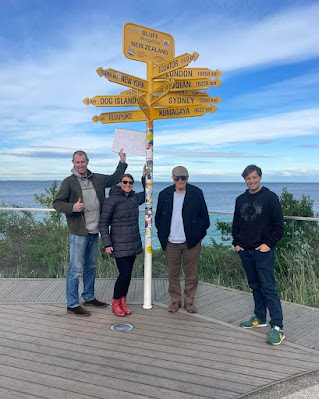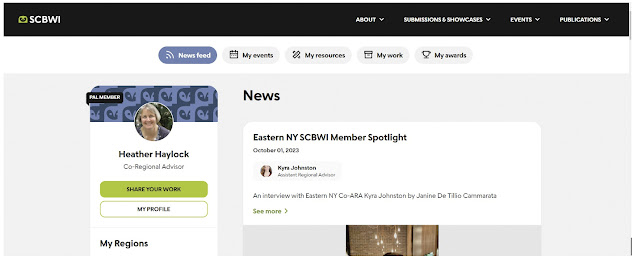 |
| Storyline Tour team left to right: Alan Dingley (Te Awhi Rito Reading Ambassador), Katie Furze (author),Kieran Rynhart (illustrator),Des Hunt (author) |
How did you feel when you were invited to take part in the Storylines Invercargill/Southland Story Tour?
This was my first Story Tour and I was very nervous, but there was no need to be – it was a fantastic experience! In five days, I visited fourteen schools and spoke to more than nine hundred tamariki. I learned a lot and arrived home feeling energised and much more confident about school visits.
For those who haven’t experienced a Storylines Story Tour, can you share what a typical day on tour looks like?
Generally, each tour member has three presentations per day: two in the morning, one after lunch. Some are solo, others involve two presenters, some three or more presenters. Storylines prepare a detailed schedule which means all you need to do is concentrate on your presentation. Most schools will introduce you and make sure you have everything you need. Afterwards, we usually had an hour or two to ourselves, before finishing off the day with dinner at a local restaurant.
What were the highlights of the Tour experience for you?
The kids – there’s nothing more satisfying than interacting with tamariki who are excited about books that you have created.
The team – it’s fun being on tour with a group of authors, illustrators, and librarians! We had a lot of laughs along the way. You learn from each other, bounce ideas around and work together in joint presentations.
The sights and culture – the tour is a great way to see parts of the country you might not normally go to. The last time I visited Bluff was thirty-five years ago! I especially loved visiting schools in rural areas where speakers are a rarity.
And is there anything you’d do differently next time?
Storylines provide ‘Guidelines for Presenters’ which are super helpful. Using these I planned a presentation that I could simplify for littlies and extend for seniors. I tried to make it as interactive as possible. I thought about which parts to use for shorter talks, and what to do when there is no large screen, or if the kids are nodding off after lunch. I also reviewed notes from past workshops and talked to writer friends who’d been on tour.
Next time I won’t have to do as much prep, because now I have a presentation that I’ve tried out fourteen times!
How did the sessions run (What did you do in your sessions)?
My presentation consisted of talking with kids about tuatara and ruru using props like soft toys, reading my books, and asking and answering questions – luckily it turns out kids are fascinated by tuatara and ruru – they had heaps of questions! I tweaked my presentation as I went along based on audience reactions.
What did you learn from the Tour experience?
A lot! Before the tour started, I was a little worried my presentation wasn’t ‘whiz-bang’ enough and that kids might be bored. However, it went well, the kids were super-engaged and had way more questions than I expected. I got better at reading the audience and adapting my content and delivery to suit. Also, teachers sometimes ask you to talk about specific topics relating to the curriculum. So, I guess the most important thing I learned was to be myself, relax and to be flexible.
What tips would you have for others if they are invited to go on a future Story Tour?
· Bring props and visuals.
· Interact with tamariki as much as possible.
· Kids of all ages love being read aloud to.
· Break your presentation up into segments so you can easily add or subtract bits for different age groups and different lengths of time. (Thanks to Fifi Colston for this great tip).
· Make sure you have some chill-out time every day to do whatever you like to do to relax.
Are there any memorable, funny inspiring moments you'd like to tell us about?
One small child in the front row looked horrified when I gave her my tuatara soft-toy to hold. I couldn’t work out why – most kids jump up and down with excitement when I ask, “Who wants to hold Henrietta?”
No one in the van knew either. It was puzzling.
Several days later, a new entrant at another school asked, “Is that a REAL LIVE tuatara?” and the penny dropped … oops!
Katie with the 'real' tuatara






Comments
Post a Comment